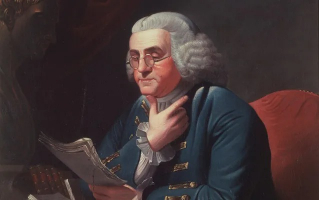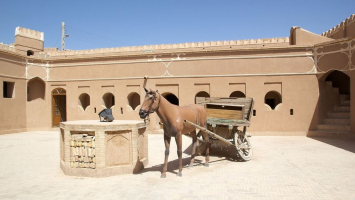Top 8 Leaders and Commanders of Revolt of The Batavian
The Batavi, a tiny but militarily potent Germanic tribe that resided in Batavia, on the delta of the river Rhine, launched the Batavian Revolt against the ... read more...Roman Empire between 69 and 70 CE. Celtic tribes and other Germanic tribes joined the uprising as well. The Batavi once again surrendered to Roman domination after peace negotiations, but they had to accept humiliating terms and a legion stationed permanently on their land at Noviomagus. The leaders of both sides involved in this uprising played an important role in charting the course of action. Therefore, the 8 Leaders and Commanders of the Revolt of The Batavian will be introduced in this paper.
-
Gaius Julius Civilis was the Leader of the Revolt of the Batavian against the Romans in 69 AD. According to his men, he was a Roman citizen descended from either Caligula or Caesar Augustus.
Aulus Vitellius accused Civilis of being unfaithful when the latter was named emperor in January 69. Later on in the year, a defender of the rival emperor Vespasian pushed Civilis to stop the German troops from getting as far as Vitellius. In order to fight the Roman troops, Civilis persuaded the Batavi, who were then joined by German tribes from beyond the Rhine. After Vitellius's death, he maintained his hold over the area and led an uprising against Vespasian. As a result, in addition to 24 ships being taken in, the Roman garrisons around the Rhine were forced away. At Castra Vetera, close to present-day Xanten, two armies led by Mummius Lupercus were routed and encircled. A Gallic empire was declared by the Gallic tribes that joined Civilis's troops. Veterans from eight Batavian cohorts joined their compatriots, and Vespasian troops dispatched to rescue Veteran people joined them as well. Along with all the Roman camps to the north of Mogontiacum, Vetera was destroyed (now Mainz). While some Roman troops were executed, others were made to pledge loyalty to the new government. However, as additional troops arrived in Mogontiacum, the situation began to swing in Rome's favor. On the Batavian "island" that was located across the Vahalis (now Waal) River, Civilis and the other rebel generals made their final stand.
Not long afterward, Quintus Petillius Cerialis' presence with such a substantial army led to Civilis' loss at Augusta Treverorum and Castra Vetera, and he was compelled to flee to the island of the Batavians. He ultimately reached a compromise with Cerialis, which allowed his people to benefit from some privileges and reestablish cordial ties with Rome. To maintain a safe distance between the combatants, the bridge across the Nabalia has been split in half. Civilis is positioned to the right, while Quintus Petillis Cerialis is positioned to the left. Following the defeat of the Batavian uprising, Civilis and Cerialis are in the midst of peace talks. The Batavians entered a time of immense wealth once a new treaty was reached.
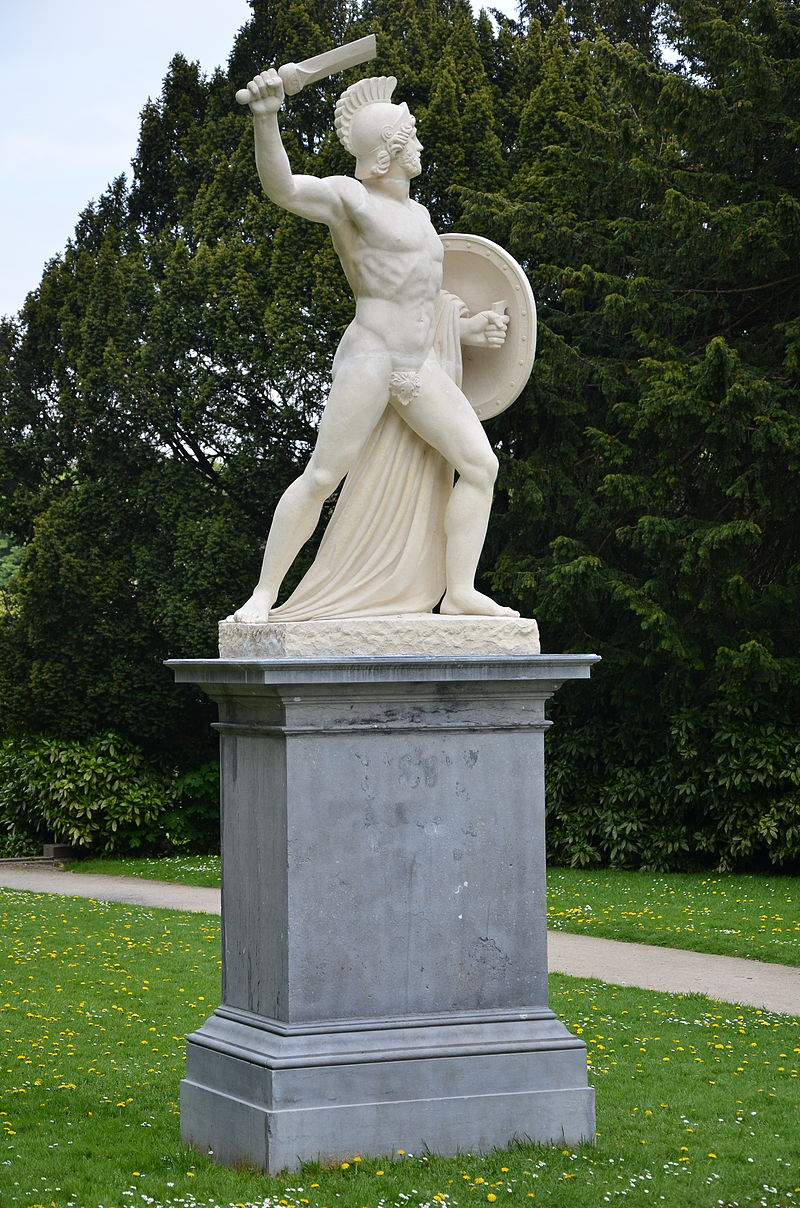
Statue of Civilis in Tervuren - Photo: wikipedia.org 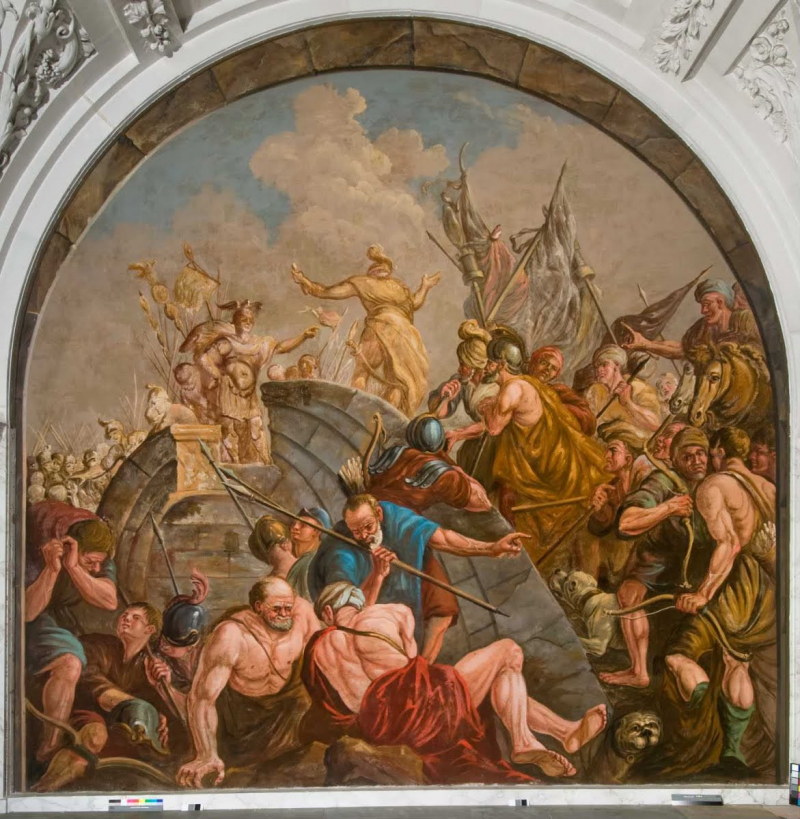
Civilis and Cerialis are conducting peace negotiations after the failure of the Batavian revolt - Photo: artsandculture.com -
Quentin Petillius Cerialis Caesius Rufus, also referred to as Quintus Petillius Cerialis, was a Roman commander and administrator who served in Britain during Boudica's uprising and later took part in the civil wars that broke out after Nero's death. Later, after putting down Julius Civilis' insurrection, he served as Britain's governor before departing again.
In 69, during the civil conflicts of the Year of Four Emperors, Cerialis as the son-in-law of Vespasian and the husband of Domitilla the Younger was taken captive by Vitellius. Cerialis succeeded in escaping while posing as a farmer and enlisting in the Flavian army. He was one of the cavalry generals that overcame Rome in preparation for Vespasian's invasion. His task was to travel the Via Salaria via Sabine territory to reach Rome. Thanks to his accomplishments and the confidence of his brother-in-law, he was given leadership of XIV Gemina, a tough province at the time called Germania Inferior. The Batavian insurrection, which saw the local tribes under the leadership of a romanized prince named Julius Civilis besiege two Roman legions at Xanten, was another local uprising that Cerialis had to cope with. Petillius Cerialis achieved success once more and was honored by Vespasian, who also granted him his first consulate.When Cerialis was appointed to lead Roman Britain in 71, he brought the II Adiutrix into the province. Gnaeus Julius Agricola, the commander of XX Valeria Victrix, also supported him. Cerialis launched a war against the Brigantes of northern England while serving as governor. When Cerialis departed Britain in 74, Titus Clodius Eprius Marcellus served as his colleague, according to a military certificate dated May 21, 74, attesting to Cerialis' second term as consul.
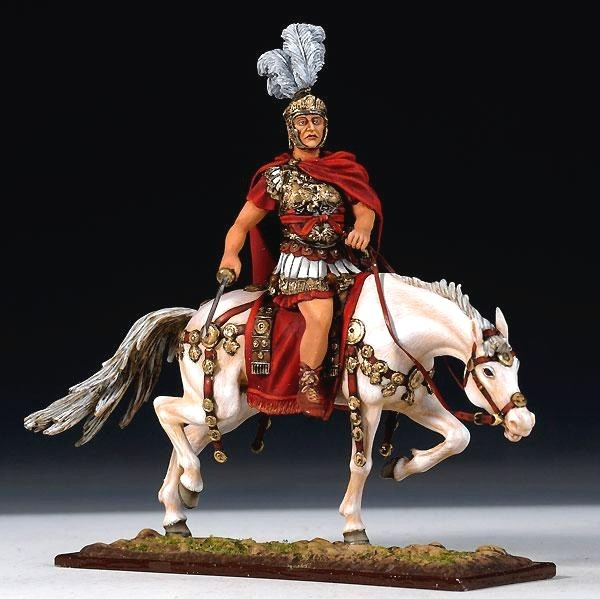
Quintus Petillius Cerialis - Photo: figurines-et-collections.com 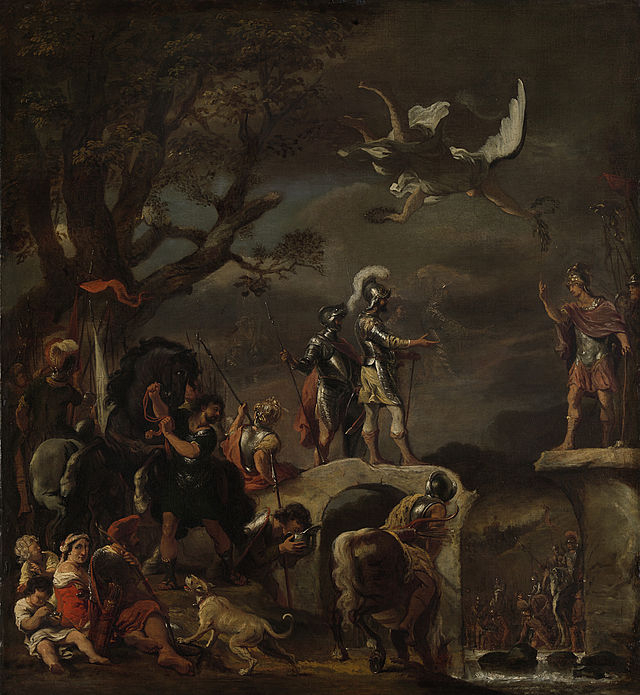
Peace talks between Claudius Civilis and Quintus Petillius Cerealis on the destroyed bridge - Photo: wikidata.org -
In the Batavian rebellion of AD 69–70, led by the Romanized Batavian chieftain Gaius Julius Civilis, Veleda, a seeress of the Bructeri, a Germanic people, rose to some notoriety when she anticipates the rebels' initial victories over Roman legions. The rebels were led by this Romanized Batavian chieftain.
Veleda was revered as a divinity by the majority of the tribes in central Germany in the second half of the first century AD and had a significant effect. She resided in a tower close to the Rhine's branch, the Lippe River. The residents of the Roman colony of Colonia Claudia Ara Agrippinensium (now Cologne) accepted her adjudication in a disagreement with the Tencteri, a confederated tribe of Germany (i.e., one beyond the limits of the Roman Empire) (i.e., one outside the boundary of the Roman Empire). The envoys were not allowed in her presence since she was acting as an arbiter; instead, an interpreter relayed their words to her and reported her decisions.
During the Roman power struggle in AD 69, the Batavian leader Civilis first built his army as a Vespasian friend, but when he observed the depleted state of the legions in Romanized Germany, he openly rebelled. Veleda merely foretold the insurrection and actively encouraged it. However, the uprising was put down as a result of a powerful display of force by nine Roman legions led by Gaius Licinius Mucianus. Quintus Petillius Cerialis' troops ambushed Civilis on his native island of Batavia in the lower Rhine; it is unknown what became of him, but Cerialis generally treated the rebels with remarkable decency in an effort to win them over to Roman rule and military service. For Veleda, she was given several years of freedom. The Romans either kidnapped her or offered her shelter in AD 77. Rutilius Gallicus, the governor of Germany, was her captor at the time. A Greek letter that mocked her prophecy was discovered near Ardea, a few miles south of Rome. Veleda behaved in Rome's best interests in those circumstances by securing Bructeri's acceptance of a pro-Roman ruler in AD 83 or 84.
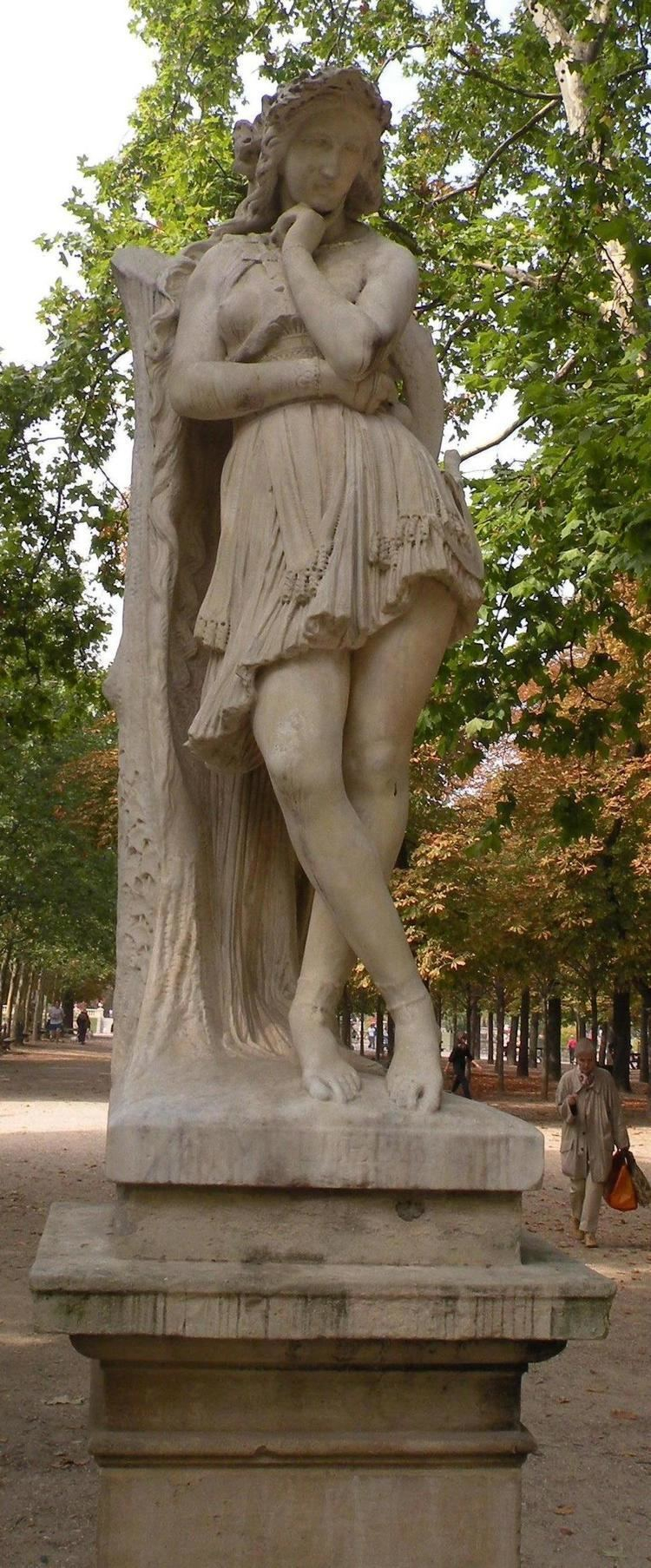
This sculpture is located in the Jardin du Luxembourg - Photo: waymarking.com 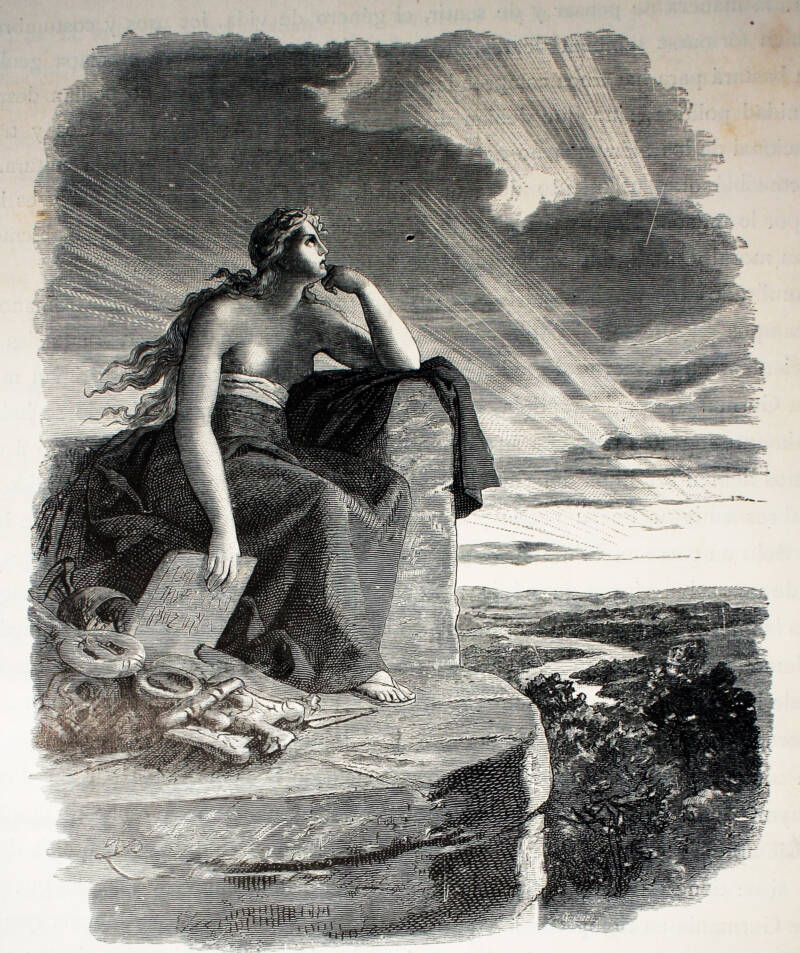
allthatsinteresting.com -
Brinno was the leader of the Canninefates tribe who joined in the Batavian rebellion at the Rhine's mouth in AD 70. Not much is known about his childhood or family but we know that he was from a wealthy German family and is thought to have collaborated with the Romans for many years prior to the insurrection. The only thing we know about his father is that he made fun of the Romans and Caligula's historic expedition against Poseidon, which took place inside the realm of the Cananefates close to modern-day Leiden, the Netherlands. Also annoying the Romans, Brinno's father seems to have been a marauder. Throughout Caligula's rule, his father had a hostile attitude toward the Romans. As a result, Brinno was ceremoniously elevated on a shield and given the task of leading the Canninefates against Rome.
He made a respectable contribution to the rebellion's early triumphs in 69 AD when it first started. With the aid of the Frisii tribe, Brinno was able to destroy the Roman winter encampment along the sea in his first raid. Brinno assaulted two Roman auxiliary battalions, but they were not ready for the attack, which was the main factor in their swift defeat. At Praetorium Agrippina, one of the demolished encampments has been recognized.
Brinno even threatened to send his forces in the direction of the nearby Roman forts. The Romans then burned down the forts in the area, including one at Traiectum, for fear that Brinno would attack them and they would be powerless to defend them.
Due to his family's reputation, Brinno was a powerful leader who won the respect of both his tribe and tribes in the area. Regrettably, he appears to have been all but forgotten throughout history. Most people are familiar with well-known Viking figures like Rollo, Ragnar, and Erik the Red. The majority of people are familiar with well-known figures like Rollo, Ragnar, and Erik the Red. They may even be aware of the famed Frisian monarch Radboud, but few have heard of Brinno, who is equally little known among my fellow Dutch. That is a shame because Brinno may be considered a very early Dutch independence warrior.
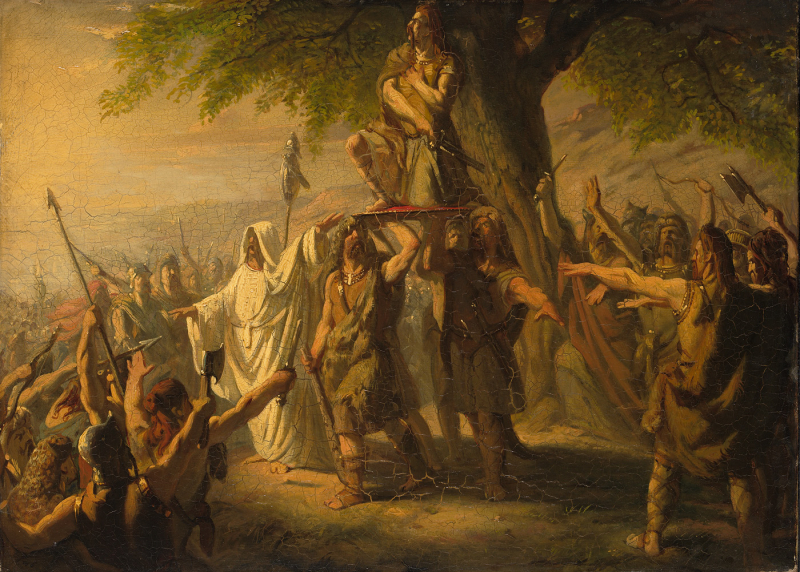
Brinno raised on the shield - Photo: wikipedia.org 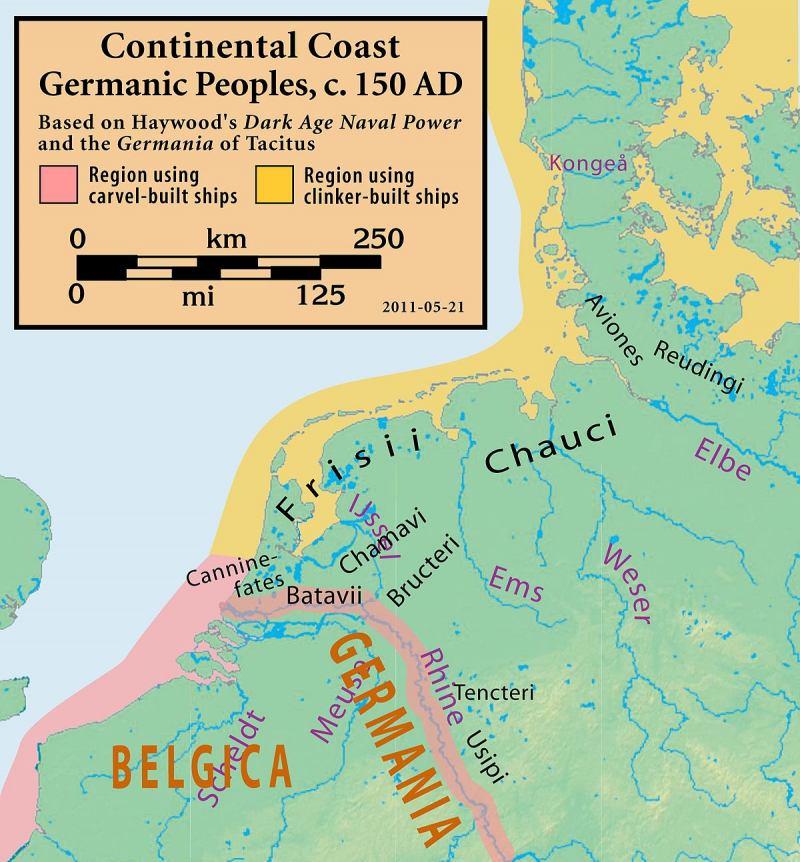
Canninefates tribe lived in the Rhine delta, in western Batavia - Photo: wikipedia.org -
Julius Classicus was a Gaulish aristocrat and military leader who belonged to the Treviri tribe in the first century AD. He led the Roman auxiliaries as a commander. He joined the insurrection of Gaius Julius Civilis during the unrest of the Year of the Four Emperors, along with Julius Tutor, another Treviran Roman auxiliary leader, and Julius Sabinus, who claimed ancestry from Gaius Julius Caesar (69 AD).
Civilis and Classicus frequently corresponded by letter while Classicus oversaw the Treviran cavalry regiment. Classicus claimed that he had more ancestors who were enemies of Rome than allies in these letters. Classicus was an accomplice in the rebellion against Rome together with Civilis. Classicus, along with leaders of the Treviri and Lingones, Sabinus, and Tutor had different beliefs from Civilis and his Batavian insurrection. While Classicus and his allies sought to establish a new Roman Empire in Gaul, the Batavians were just interested in achieving tribal freedom. Julius Classicus recited an oath of allegiance to the Legion I Germanica and the encamped Legion XVI Gallica in Germany, ordering them to swear allegiance to their new emperor, Julius Sabinus. He did this after killing a deserter named Vocula who tried to flee after witnessing the betrayal of Classicus and the others.
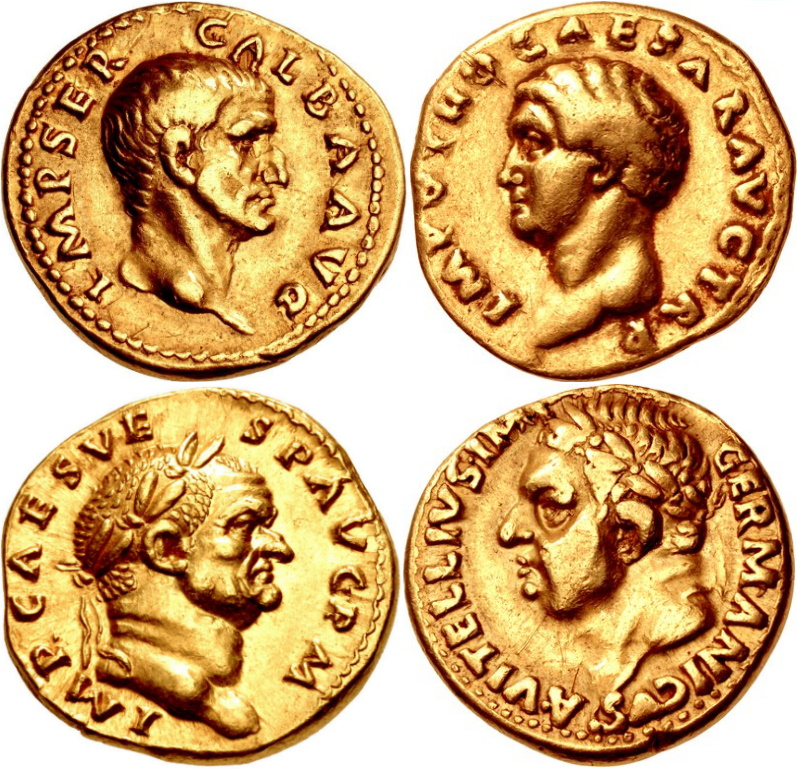
Aurei of the four Roman emperors of AD 69 includes Galba, Otho, Vitellius, Vespasian - Photo: wikipedia.org 
The symbol of Legio XVI Gallica - Photo: deviantart.com -
During the Batavian uprising of AD 69, Julius Sabinus was an aristocratic Gaul of the Lingones. In an effort to establish an independent Gaulish kingdom, he made use of the unrest that followed Nero's death in Rome.
Julius Sabinus instigated a revolution in Belgian Gaul in AD 69 by taking advantage of the unrest that rocked the Roman Empire at the time and the Batavian uprising on the Rhine. However, the Sequani, who were still loyal to Rome, swiftly routed his poorly organized army. After being defeated, he pretended to be dead by informing his servants that he was going to commit himself. Then he set fire to the villa where he was staying. Only his wife Epponina and a few obedient slaves knew where he had hidden in a neighboring cellar. After the failure of the rebellion, the territory of the Lingons was separated from Belgian Gaul, and placed under the direct supervision of the Roman army in the Rhine. A part of the Roman province of Germania Superior was formed then.
Not long afterward, Sabinus and Epponina were apprehended in AD 78 and transported to Rome for interrogation by Vespasian, the emperor. He ordered the execution of the Sabinus' spouses despite the pleas of Epponina.
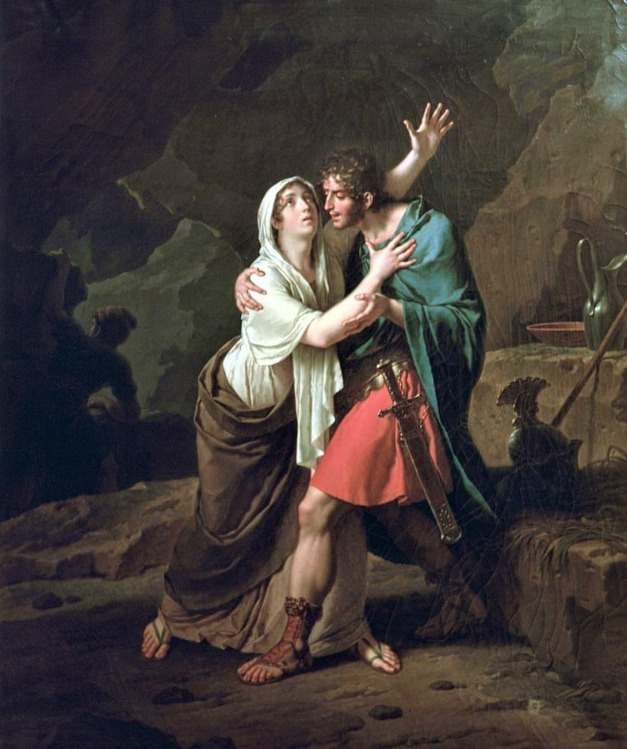
Julius Sabinus and Epponina - Photo: wikipedia.org 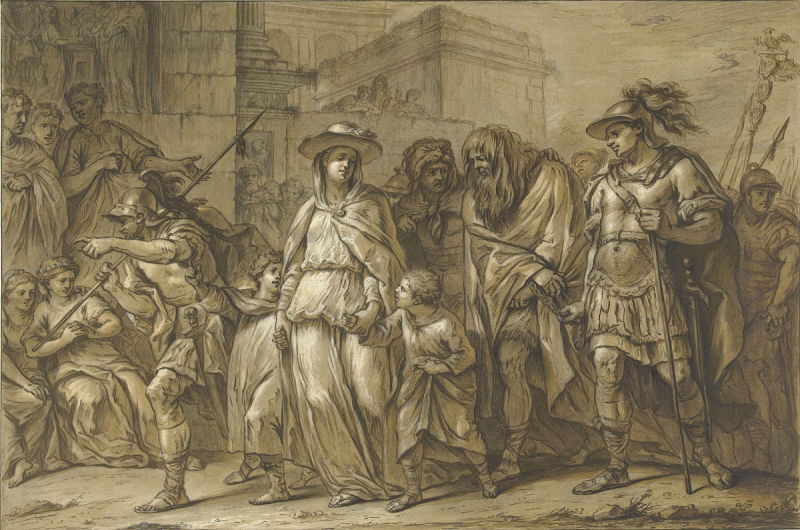
Julius Sabinus en Epponina en hun twee kinderen werden naar Rome gebracht - Photo: artsandculture.com -
Claudius Labeo belonged to the Batavian tribe and fought for the Roman Empire against the uprising. He served as the prefect of the Batavian ala of auxiliary and was a military Commander of Batavian.
The Roman empire was split in 69 by civil war, and Vitellius, one of the contending emperors, wanted more troops. The Batavian uprising had this as its direct reason. The Dutch River region became a battlefield in August as a result of a plot orchestrated by a nobleman by the name of Julius Civilis. However, there were other significant factors at play, and it appears that one of them was the ancient Batavian aristocracy's forced power-sharing arrangement with other Batavians. The first group was recognized by their formal name Julius Civilis and had held Roman citizenship for some time; the second group had just recently acquired citizenship and went by the name Claudius. This may help to explain why Julius Civilis harbored such a deep personal enmity towards Claudius Labeo given his affiliation with this organization. Since his murder was unpopular with the Batavians and his constant presence encouraged dissent, Civilis takes him into exile in Frisia.
Claudius Labeo, however, managed to get away by buying off his captors. After receiving a small army of infantry and cavalry, he decided against going on his expedition against the Batavians and instead incited some Nervians and Baetasii to take up arms and fight against the Batavians' allies Cananefates and Marsac.
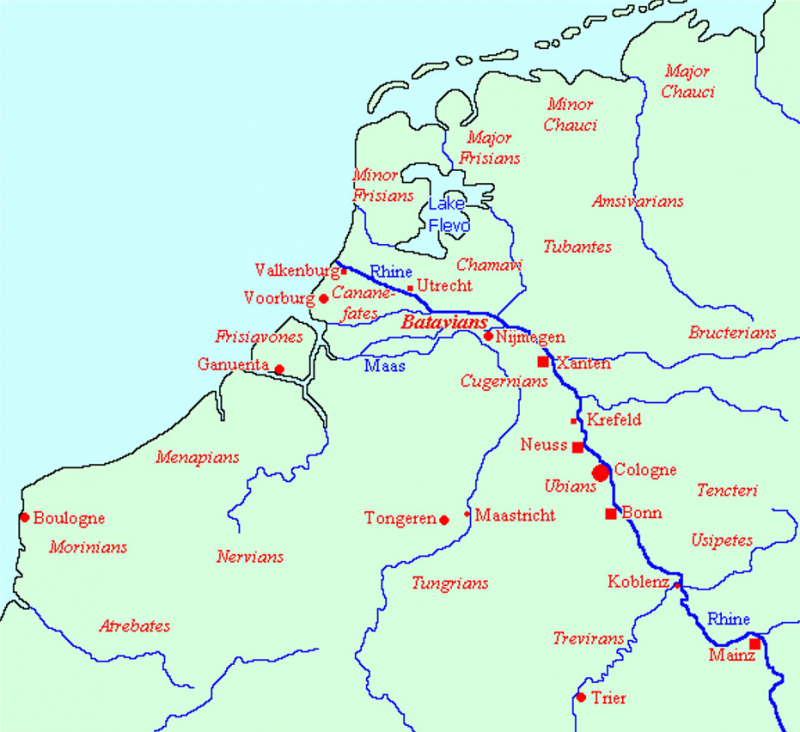
The Low Countries in the Roman age was divided by civil war - Photo: livius.org 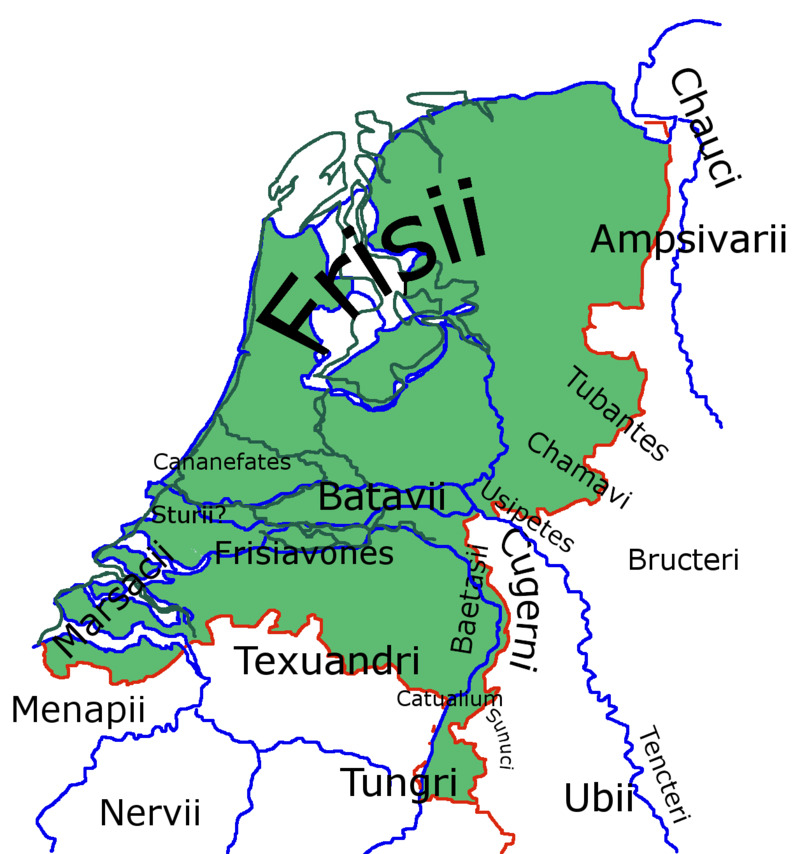
Frisia where Claudius Labeo was exiled - Photo: wikipedia.org -
During the first century, Marcus Hordeonius Flaccus served as a senator for Rome. He served as Gaius Calpetanus Rantius Sedatus's coworker as an effective consul from March to April 47. Later, during the Batavian uprising, he served as the head of the Rhine army.
Marcus Hordeonius Flaccus had a life that was mostly unknown to us. During Tiberius' rule, his father, who resided close to Naples, served as procurator of the imperial possessions in Gallia Narbonensis. Prosecutors are often wealthy people, without the personal dignity that makes them acceptable as knights or senators.
In order to help him against Vespasian's insurrection, Emperor Vitellius ordered troops from the Rhine frontier to be redeployed to Italy in 69. However, Flaccus refused because of rumors of a possible uprising that occurred by the Batavians. Flaccus resisted ordering his army to leave the Rhine. Instead, he dispatched men from the Augustan Eighth Legion to Nijmegen, the principal Roman stronghold in the Batavian nation, from Novae in Moesia. It was only when Vitellius ordered the forced recruitment of the Batavians that Flaccus rebelled against the Romans. Inability to make a decision in favor of the emperor Vitellius prevented him from quelling the Batavian uprising. His later reputation suffered. After trying to celebrate Vespasian's triumph, he was killed by his own troops.
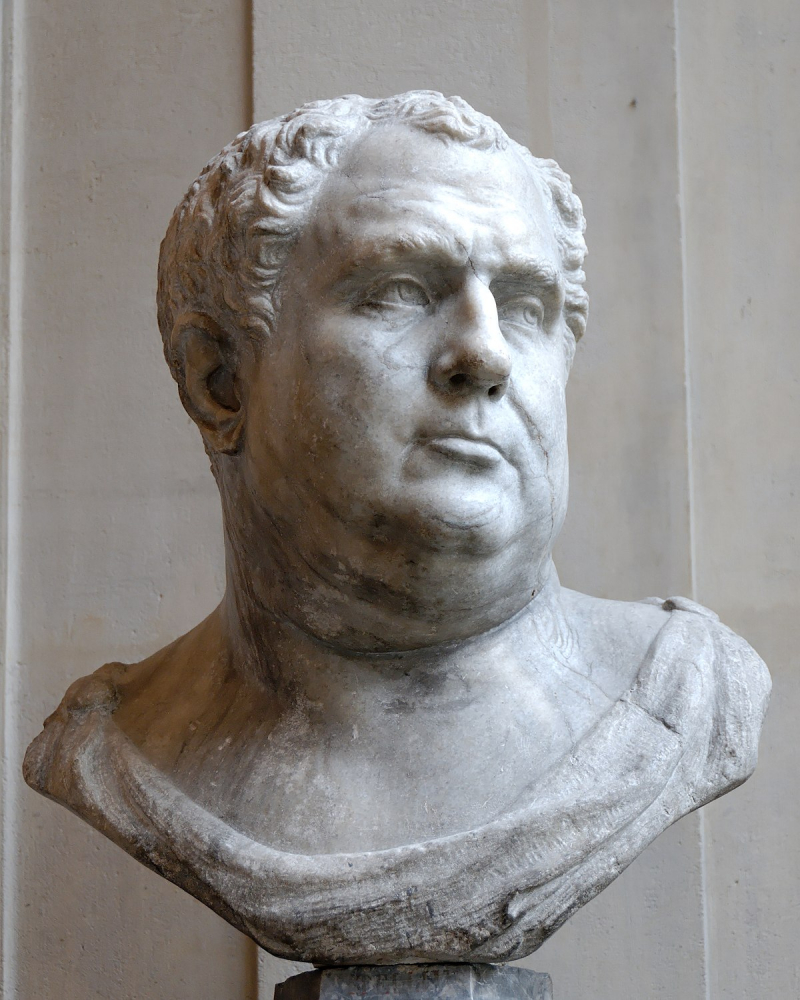
Marble bust of Emperor Vitellius in Bardo National Museum, Tunisia - Photo: wikipedia.org 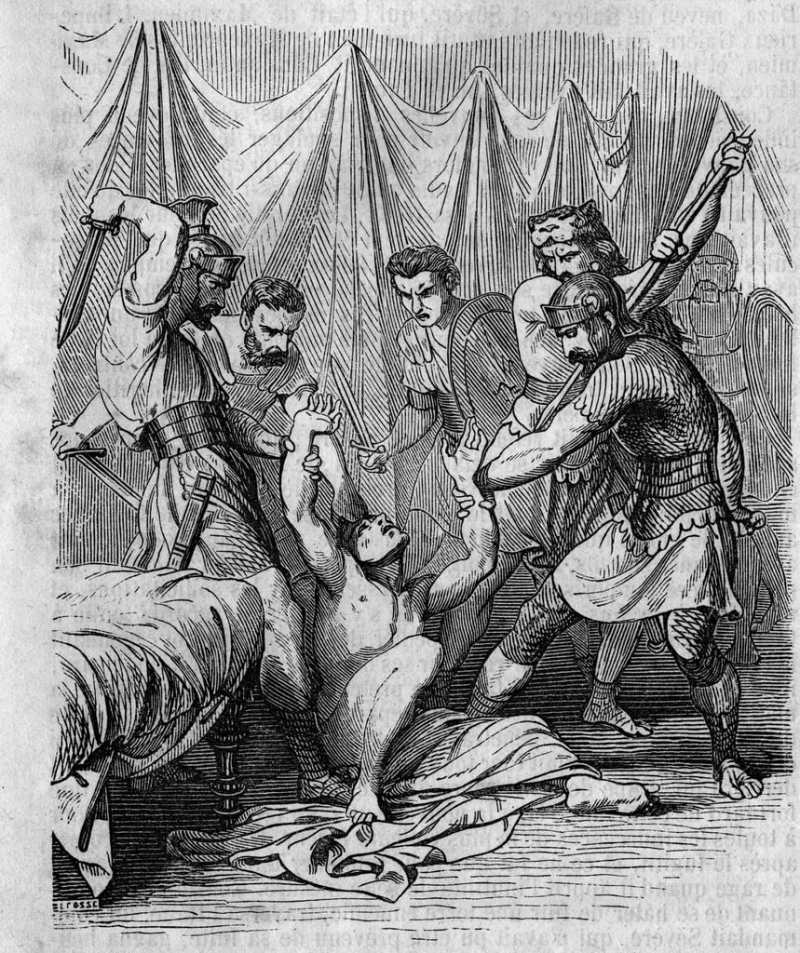
Marcus Hordeonius Flaccus was massacred by his own soldiers - Photo: meisterducke.com










